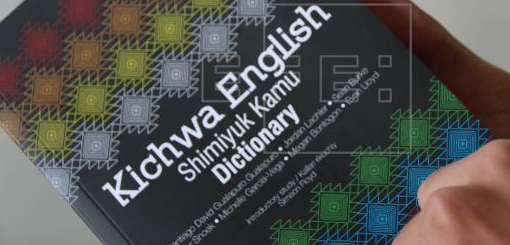Learn how to say computer in Quichua and more interesting stories
A pioneering Quichua-English dictionary was presented in Quito by its author Santiago Gualapuro, a native of the community of Otavalo, in northern Ecuador, who developed his work in Canada.
The 278-page "Kichwa English Shimiyuk Kamu Dictionary" seeks to position Quichua and promote research into linguistic and philological s tudies of Ecuador's indigenous communities, the author said.
tudies of Ecuador's indigenous communities, the author said.
"We hope that the Quichua community feels empowered because it is our language," he said of his dictionary written in Quichua.
In Quichua, there are two major variants in Ecuador: the highlands (Andean highlands) and the lowlands (Amazon), but both share the same writing system, despite their oral differences, explained U.S. scholar Simeon Floyd in the introduction to the dictionary.
"There is street English and academic English," Gualapuro gave as an example and explained that despite being the same language there can be differences between the one and the other variant because the language is something "adaptable" and therefore absolute standardization is not possible.
Among the difficulties of making a dictionary is the fact that not all words have translation. "Quichua is an oral language, modern things like a computer do not exist", therefore, in order to translate them, one looks for meanings that resemble each other.
For example, computer in Quichua means "antanikik", a term composed of "anta", which means "thing made of iron", and "nikik", which means "counting, accounting" and so, "antanikik" is a machine that does accounting, explained Gualapuro.






